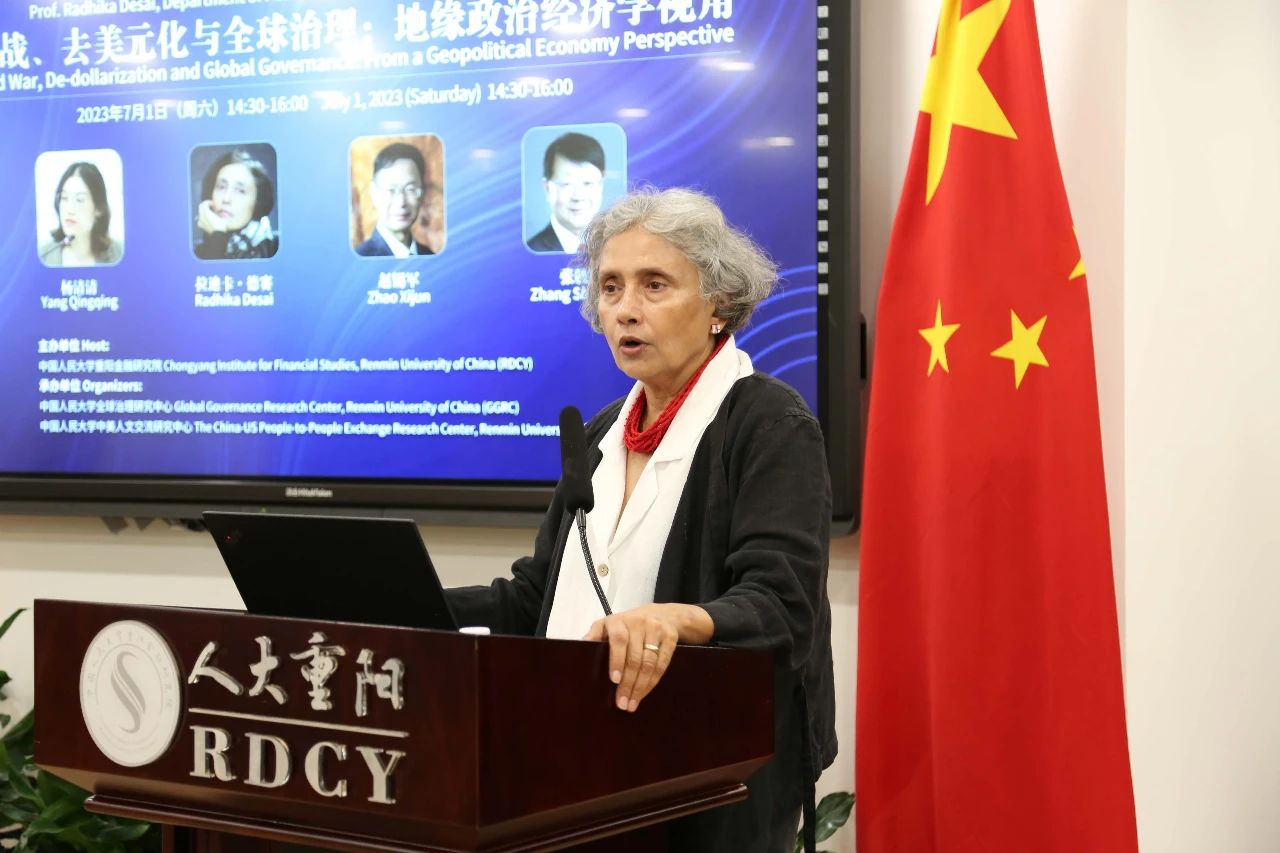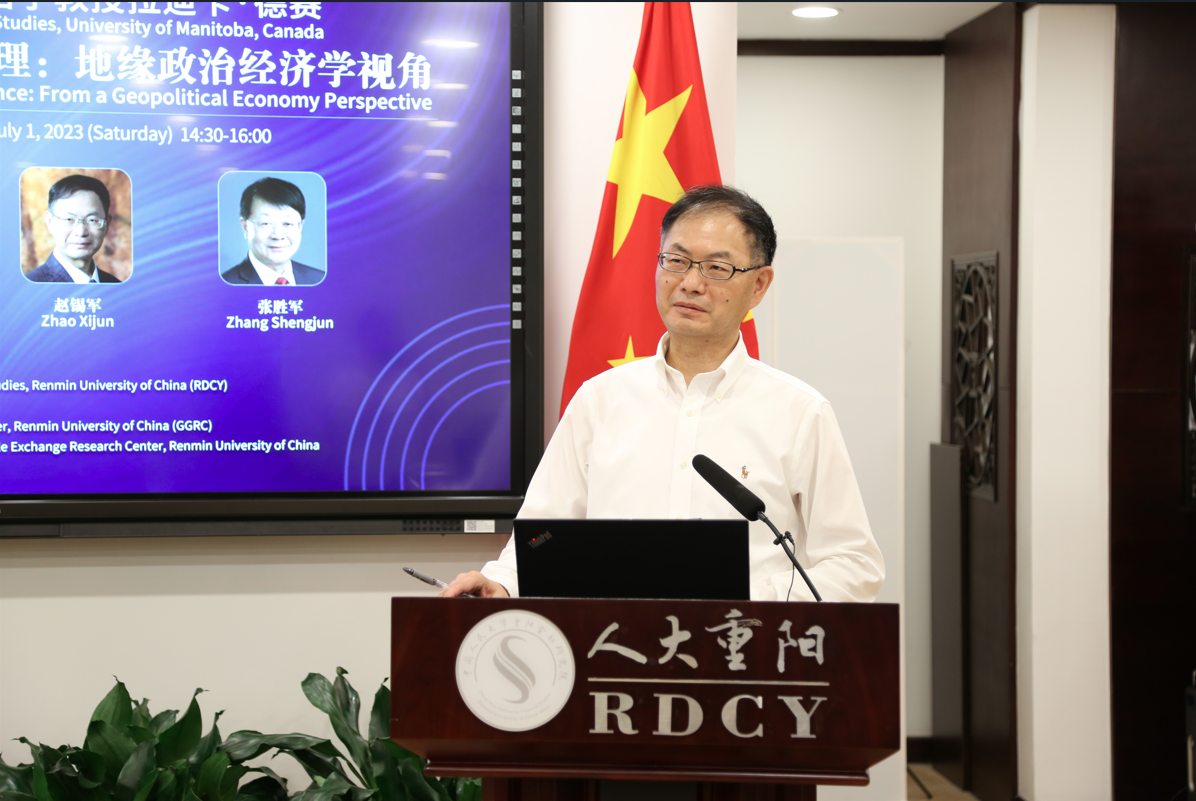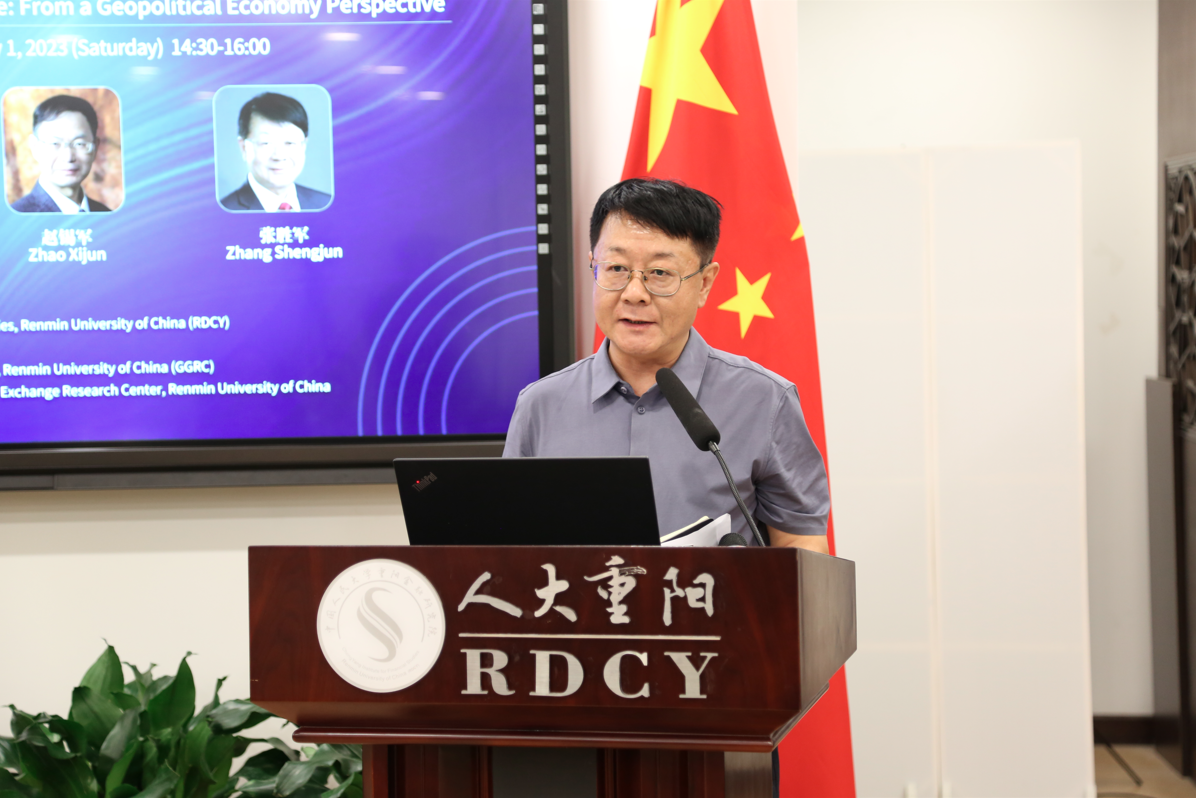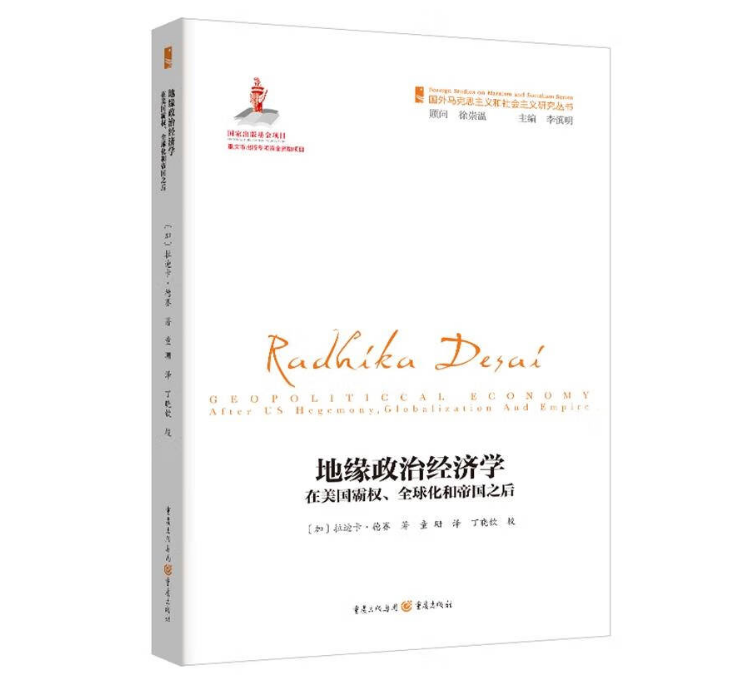加拿大学者警示:为了维护美元霸权,美国要下狠手了
2023-07-05 作者: 拉迪卡·德赛
人大重阳综合媒体报道:2023年7月1日,加拿大曼尼托巴大学政治学教授、地缘政治经济学研究中心主任拉迪卡·德赛(Radhika Desai)受邀出席由中国人民大学重阳金融研究院(人大重阳)主办、中国人民大学全球治理研究中心和中国人民大学中美人文交流研究中心承办的“人大重阳全球治理论坛(2023年夏季)", 并做了题为“新冷战、去美元化与全球治理:地缘政治经济学视角”的公开演讲,围绕新冷战、去美元化及地缘政治经济等话题与中方专家及现场观众展开热烈交流。北京日报、中国社会科学报、浙江日报、深圳卫视等媒体报道此次会议。

加拿大曼尼托巴大学政治学教授、地缘政治经济学研究中心主任拉迪卡·德赛(Radhika Desai)
此次讲座由中国人民大学重阳金融研究院副院长杨清清主持。她在开场时重点介绍了德赛教授在过去三年来与人大重阳在共同研究、智库建设及国际交流等方面的合作成果,高度肯定了德赛教授在地缘政治经济研究领域的丰硕成果为当前国际问题研究提供了很有价值且有现实意义的参考。
随后,德赛教授从当前新冷战的国际形势、以美元为中心的国际货币体系面临的挑战与全球治理等多个角度出发,分享了她的观点。德赛认为,"去美元化" 的货币政策,除了广泛被讨论的外部挑战外,还存在着美元体系自身的内部矛盾,是一个内部非常有冲突的体系。实际上,美国在国际上的经济地位正在下降,而且是全面的、混合性的前沿发展领域倒退。美国国内经济也出现了生产力的下降,不平等现象达到了前所未有的程度,造成了很多社会冲突。她认为,美国为了维护其全球霸权地位,转嫁其国内风险,正在世界范围内采取强权手段,发动一场新冷战。
德赛表示,目前因为没有一个"全球国家",所以也不可能有一个“全球国家的资本主义”,也没有所谓的“世界货币”。英镑体系是一个帝国主义及殖民体系下的货币,而不是国家货币或国际货币。英镑体系的削弱,一方面促使美国统治阶级用美元体系取代英镑体系;另一方面它也标志着各种因素的作用,共产主义和非殖民化标志着帝国主义的削弱。这也意味着美元体系背后总是有不稳定因素,如果没有庞大的朝贡殖民地,美国就永远无法出口资本。她还强调了“特里芬难题”,指出美元既作为国家货币也作为国际储备货币发挥作用的矛盾,美元的持续流动助推了全球贸易,这意味着美国持续存在赤字,从而削弱了人们对美元及其储备货币作用的信心,导致这种不稳定性。因此,很多国家都在观察是不是会有一种新的国际货币体系出现。
德赛认为,一个稳定、公正和发展的国际货币系统须满足以下六点关键要素:一是有资本管制;二是多边主义共存(不是帝国统治);三是面向贸易和投资需求,而非金融投机;四是债权人责任与债务人责任并存;五是盈余国家责任与赤字国家责任;六是注重平衡。
在专家点评环节,中国人民大学中国资本市场研究院联席院长、中国人民大学重阳金融研究院高级研究员赵锡军,北京师范大学政府管理学院全球治理研究中心主任、中国人民大学重阳金融研究院高级研究员张胜军发表了评论观点。

中国人民大学中国资本市场研究院联席院长、中国人民大学重阳金融研究院高级研究员 赵锡军
赵锡军认为,德赛教授从美元和英镑体系的对比拓展并丰富了国际货币体系的研究视角。美元体系确实起到了配置资本的功能,通过美元在国际资本市场上、国际金融市场上的流动、运作来引导或带动整个国际资本的跨境流动。美国经济从巅峰时占全球经济40%回落到现在25%左右,美元体系运行的缺陷暴露得更加明显。还有一些新的变化,美国越来越把美元作为一种武器,也推行了很多金融制裁,这实际上损害了美元体系的基础。人民币国际化,同样也会面临美元所面对的一些矛盾和问题。但国家货币充当国际货币中间根本的矛盾如果得不到解决,那么其持续性、稳定性是很难维持的。

北京师范大学政府管理学院全球治理研究中心主任、中国人民大学重阳金融研究院高级研究员 张胜军
张胜军认为,德赛教授是一位“真相揭露者”,她的演讲是对美国新自由主义的一种揭批。他认为“美式全球治理”事实上是通过三种方式进行的。一是制造危机,比如金融危机;二是发动战争,如策动地区的军事行动;三是向第三世界抢夺财富。其实美国对于这个世界的依赖比我们想象的要大,也就能自然明白为何前段时间美国国务卿布林肯、财政部部长耶伦那么急迫地要来中国,和中国谈判。由于中国和发展中国家的态度,应该是冷战以来对新自由主义的一种坚定的拒绝。这个背景之下,相信美国可能会采取比较激烈的手段来应对。
在互动环节,德赛回答了现场观众有关新冷战、新自由主义、人工智能及对中国建议等多个提问,现场气氛热烈。在“为何美国会对中国污名化”这一问题上,德赛表示,西方要开始新冷战,一定会有污名化对方的过程,这是毫无疑问的。由于美国所采取的政策忽略了一些新兴经济体以及因金融带来的不平等性,而正是因为这些让美国人民自己都在水深火热之中的政策,让人民都投票给了特朗普,但像特朗普这样的政客能够给他们带来什么呢?特朗普政府,以及现在的拜登政府,没有去挖掘新自由主义这种政策的问题所在,而是选择转移注意力,让中国来承担所有美国这些问题的责任,对于中国污名化的源头就在这里。
德赛还认为,中国的创新活力和技术发展,哪怕在备受遏制的情况下,仍是智慧地,且有创新精神地发展的。现在美国主导下的创新体系是非常令人失望的,这个体系没有办法鼓励真正的创新,更没有办法鼓励世界所需要的创新。
拉迪卡·德赛 (Radhika Desai) 是加拿大曼尼托巴大学政治学教授、地缘政治经济学研究中心主任。她提出了一种新的历史唯物主义方法来理解世界事务,即基于国家物质性的地缘政治经济。她近期的著作包括《地缘政治经济学:在美国霸权、全球化和帝国之后》(2013年),《卡尔·波兰尼和21世纪资本主义》(2020年),《革命》(2020年)和《日本的长期停滞》(2022年)。她的文章和书籍章节出现在国际学术期刊和编辑卷上。她与Alan Freeman共同编辑了曼彻斯特大学出版社的《地缘政治经济》系列丛书,以及布鲁托出版社的《资本主义的未来》系列丛书。她的最新著作是《资本主义、新冠病毒和战争:地缘政治经济(2022)》(点击链接了解图书)。
(欢迎关注人大重阳新浪微博:@人大重阳 ;微信公众号:rdcy2013)
地缘政治经济:美国霸权、全球化和帝国之后
https://fernwoodpublishing.ca/book/geopolitical-economy#:~:text=
拉迪卡·德赛
随着多极世界从金融和经济危机的尘埃中崛起,地缘政治经济学从根本上重新解释了世界秩序的历史演变。
拉迪卡·德赛对主导国际政治经济和国际关系学术界的美国霸权、全球化和帝国理论进行了激进的批判,揭示了美国通过美元统治世界的企图屡屡失败的意识形态根源。
德赛复兴了革命性的思想传统,将阶级和民族的观点结合起来看待“生产国关系”。 在全球动荡和世界权力分配发生深刻变化的时代,《地缘政治经济学》对塑造当代国际秩序的历史进程进行了生动而令人信服的描述。
地缘政治经济:美国霸权、全球化和帝国之后。 世界资本主义的未来
https://hrcak.srce.hr/file/211319
拉迪卡·德赛, 2013 伦敦Pluto Press,Fernwood Publishing。 页313
拉迪卡·德赛(Radhika Desai)的书《地缘政治经济:美国霸权、全球化和帝国之后》是《世界资本主义的未来》系列丛书的一部分,代表了深刻的反思,以及对世界上最重要的政治经济关系的概述,从 19世纪末至今。 本书采用面向政治经济过程和规律的科学方法,解构了致力于国际政治和经济关系的主流文献中常见的神话。
作者主要以对霸权稳定理论(HST)的批判为基础,运用科学马克思主义的理论视角,颠覆了世界主义的世界观,描述了资本主义经济运行的关键政治和经济前提。 这是一本拒绝当代世界霸权可能性的书,根据作者的说法,任何国家都无法实现这种霸权,甚至美国也不行。也许,正如这位评论家所认为的,这本书最重要的贡献是对当代世界霸权的解构。 关于世界经济运作的主流观念,以及德赛称之为世界主义的观念,包括霸权、全球化和“全球经济”,这些观念主导了国际关系学科(德赛称之为“资产阶级学科”)。
德赛的主要论点是,不平衡和综合发展(UCD)的过程是现代世界国际关系的特征,整本书都围绕该论点进行组织,并在第一章“理论”章节中进行了细致的解释。 这些过程以辩证的方式演变,一方面,占主导地位的国家倾向于维护现有的有利于它们的资本主义发展的不平衡结构,包括通过正式和非正式的帝国主义。 另一方面,竞争国家在某些情况下加速了资本主义的发展。 例如苏联,共产主义的发展与占主导地位的国家的帝国项目相竞争。
国家在国内层面主导政治经济,在国际层面主导地缘政治经济。 不平衡和综合发展论最恰当地描述了现代资本主义国际关系的世界(第2-3页、第10-11页)。 因此,它代表了地缘政治经济学的理论起点。 发展不平衡是全球经济的特点,没有发展,世界经济就无法运转。 强大的发达国家倾向于维持现状,而竞争者、发展中国家则希望改变这种秩序。 联合发展使加速发展并通过发展实现变革成为可能。 德赛拒绝接受资本主义经济是全球性的论点。 他认为,它并不是真正的全球性,因为它是通过不同国家发挥作用的,而这些国家为了保护自己的利益而相互竞争。 没有国家,资本主义就无法运作,因为国家是资本主义的核心。
在第二章“国家的物质性”中,作者除了对斯密、汉密尔顿、李斯特、凯恩斯和波兰尼的思想进行了理解外,还对马克思和恩格斯的思想进行了新颖的解释,以期说明这一点。 为了国家的物质性,并恢复“他们对大多数马克思主义经济学的蔑视的危机理论”。 马克思和恩格斯以及其他上述思想家是自由贸易(实际上是工业化产品从殖民国家到殖民地的“自由贸易”的一种方式)倡导者的论点被解构,表明他们理解自由贸易的中心地位。 这种“自由贸易”有利于帝国主义和第一个工业化国家(英国)的世界地位的崛起
权力,实现现代文明史上不会再重演的霸权。 为了克服由于需求不足,资本需要其祖国边界之外的市场,从而创造了正式的(领土)殖民地,并且在第二次世界大战后,大多是非正式的殖民地。 后来的资本主义非马克思主义批评者,如凯恩斯和波兰尼,也认识到国家在资本主义社会中发挥着核心作用。 “他们还主张扩大这一作用,以促进充分就业和社会保护”(第 20 页)。
在布雷顿森林谈判期间,凯恩斯建议建立多边货币和清算系统,以最大限度地减少贸易失衡。 尽管如此,美国希望利用其他国家的弱点,效仿英国十九世纪的角色,作为一个国家,不是通过正式的殖民地体系,而是通过“自由贸易”和建立国际贸易体系来统治世界。 美元作为世界货币。 凯恩斯的提议因此被拒绝。
第三章的标题是“美国帝国的职业生涯”,主要涉及第二次世界大战之前的美国帝国历史,从而提供了历史考虑到美国想要取代英国成为世界主导力量的野心。 然而,美国从来都不是一个“典型”的殖民国家,尽管它拥有几个自己的殖民地。 第一次世界大战(在联邦储备银行成立一年后开始!)彻底耗尽了欧洲殖民列强的财政,使它们成为美国的债务人。这对于美国成为世界主宰国家的意图至关重要,当然 ,美元成为世界货币(而不是英镑)。 第二次世界大战是美国和美元取代英国角色的最佳机会,从而成为英国世界统治地位的真正继承者。 美国通过自由贸易建立自己的帝国的意图也体现在威尔逊总统和罗斯福的地理学家鲍曼(《新世界》的作者)的著作中。
美国在两次世界大战期间统治世界的可能性的重要性和诱惑可能最直接地通过 H. 卢斯在 1941 年提出的“美国世纪”概念表达出来。他预见到了即将到来的战争(美国 当时尚未处于战争状态)作为建立世界统治地位的机会。 1948 年,G. F. 凯南 (G. F. Kennan) 关于美国在战后世界的地位以及如何 应该维护:
我们拥有世界约 50% 的财富,但人口只占世界的 6.3%。 (……)在这种情况下,我们不能不成为嫉妒和怨恨的对象。 我们未来一段时期的真正任务是设计一种关系模式,这将使我们能够维持这种不平等的地位,而不会对我们的国家安全造成积极损害(引自德赛,第96页)。
由于即使在20世纪50年代,美国也无法保持竞争力并创造足以维持稳定增长的需求,因此转向“军事凯恩斯主义”和“军事熊彼特主义”,建立国家安全复合体,在朝鲜和越南发动战争 发展强大而先进的军事工业,补贴资本主义经济持续增长所需的需求。
在关于 HST 的章节中,作者解构了这一理论,该理论主要由 C. Kindleberger 提出,他声称美国在 20 世纪 70 年代石油危机之前一直是世界霸权。 事实证明,即使在这个“霸权时代”,美国维持美元世界货币地位的努力也从未完全成功。 自西欧和日本重新成为世界经济增长的第二极和第三极以来,美国的世界作用正在缓慢但持续地减弱。
标题为“更新”的章节解释了尼克松、福特、卡特和里根政府期间的情况。 保护美元的尝试失败了,黄金窗口最终被尼克松总统于 1971 年单方面废除(第 156 页)。 与那些认为这是神来之笔的人相反,仅仅两年后,当尼克松和他的国家安全顾问基辛格设法使石油价格翻两番,造成“石油冲击”时,美元就下跌并稳定下来。 这是挽救美元作为世界货币地位的一系列尝试中的第一个(第 158-159 页)。 这种“打开黑金窗口”的“救援行动”在接下来的几十年里继续进行,通过一系列的金融化,增加了资本流入,帮助美国解决了自身的赤字问题。 本章提出了里根时代带来美国霸权复辟的错误观点。放松管制和造成“第二次冷战”的另一场军事集结从长远来看对美国经济有益,现在已经被解构了。
关于“全球化”和“帝国”(第7章和第8章的标题明显标有问号),分别主导了1990年代和2000年代的观点,作者声称它们基于民族国家不相关的假设 解释世界秩序(全球化)或只有一个民族国家(美国)相关(帝国)。
作者拒绝这两种观点:
1... 坚持认为民族国家是资本主义运作的关键,因为它们主导着国内层面的政治经济和国际层面的地缘政治经济。
2... 全球化理论家通常将其描述为超越个别国家影响力的不可阻挡的过程。
然而,德赛认为全球化主要是克林顿政府的政治经济范式,继之以布什政府的帝国范式。 克林顿政府主导的所谓“新经济”被证明是短暂且容易逆转的,并试图为美国资本流动打开新市场,而布什政府时期的经济增长主要依靠住房贷款(融资)。 次贷和金融衍生品)和房地产价格过度膨胀。 房地产泡沫破灭后,又发生了资本主义危机,造成了现在的局面
通常被称为大衰退。
最后一章的标题是“结论:多极时刻”,讨论当前美国奥巴马政府时期,其特点是发达国家的金融和实体经济危机,以及竞争国家特别是金砖四国的崛起。 由于该书于2012年完成,显然没有包含地缘政治经济中石油产量增加、油价下跌以及美国经济复苏的影响。 除其他结论外,作者指出,我们生活在一个由可能比以往任何时候都更多的主导国家和竞争国家组成的多极世界,任何国家的霸权都比以往任何时候都更加不现实,因为文明成为工业和技术进步的出现,创造了 现代资本主义经济。
读完这本书后,得出的结论是,如果仔细阅读,它是一笔非常宝贵的财富,不仅对科学家来说,而且对研究生和博士生以及政策制定者来说也是如此。 它打开了不同的视角,并以科学且易于理解的方式解释了过程。 它还将书中解释的主题的各种先前知识和理解连接成清晰的因果关系。
佩塔尔·库雷西奇
Geopolitical Economy: After US Hegemony, Globalization and Empire
https://fernwoodpublishing.ca/book/geopolitical-economy#:~:text=
By Radhika Desai
Geopolitical Economy radically reinterprets the historical evolution of the world order, as a multi-polar world emerges from the dust of the financial and economic crisis.
Radhika Desai offers a radical critique of the theories of US hegemony, globalisation and empire which dominate academic international political economy and international relations, revealing their ideological origins in successive failed US attempts at world dominance through the dollar.
Desai revitalizes revolutionary intellectual traditions which combine class and national perspectives on ‘the relations of producing nations’. At a time of global upheavals and profound shifts in the distribution of world power, Geopolitical Economy forges a vivid and compelling account of the historical processes which are shaping the contemporary international order.
Geopolitical Economy: After US Hegemony, Globalization and Empire. The Future of World Capitalism
https://hrcak.srce.hr/file/211319
By Radhika Desai
2013. London: Pluto Press, and Halifax: Fernwood Publishing. Pages: 313. ISBN 978-0745329925.
The book by Radhika Desai titled Geopolitical Economy: After US Hegemony, Globalization and Empire and part of The Future of World Capitalism book series, represents a profound introspection, as well as an overview of the most important politico-economic relations in the world, from the late-19thcentury until the current period. This book deconstructs common myths present in the mainstream literature devoted to international political and economic relations by using a scientific approach oriented towards processes and laws of political economy.
Drawing mainly on the critique of the hegemony stability theory (HST), and using the theoretical perspective of scientific Marxism, the author overturns cosmopolitan visions of the world and describes the political and economic prerequisites crucial for the functioning of the capitalist economy. This is a book that rejects the possibility of a contemporary world hegemony, which according to the author could not be conducted by any state, not even the U.S.A. Maybe the most important contribution of this book, as this reviewer sees it, is the deconstruction of mainstream ideas about the functioning of the world economy, and of ideas that Desai calls cosmopolitan and that include hegemony, globalization and “global economy”, which dominate the discipline of international relations (and to which Desai refers as “the bourgeois discipline”).
Desai’s main thesis, around which the whole book is organized and meticulously explained in the first, “theoretical” chapter, is that the processes of uneven and combined development (UCD) characterize international relations of the modern world. These processes evolve in a dialectic in which, on the one hand dominant states tend to preserve the existing uneven configurations of capitalist development which favours them, including through formal and informal imperialism. On the other hand, contender states accelerate the capitalist, and in some cases. such as the USSR, communist development contests imperial projects of dominant states.
The states dominate the political economy on the domestic level, and the geopolitical economy on the international level. The uneven and combined development thesis most appropriately describes the world of modern capitalist international relations (pp. 2-3, 10-11). Therefore, it represents a theoretical starting-point for geopolitical economy. Uneven development characterizes the global economy, which cannot function without it. Powerful and developed states tend to seek the status quo while contender, developing, states want to change that order. Combined development is what makes the acceleration of development, and through it change, possible. Desai rejects the thesis that the capitalist economy is global. According to him, it is not truly global because it functions through different states which are in mutual competition to protect their interests. Capitalism cannot function without the state, as the state is central for capitalism.
In the second chapter ‘The Materiality of Nations' the author, besides providing an understanding of the ideas of A. Smith, Hamilton, List, Keynes and Polanyi, also provides a novel interpretation of Marx and Engels' ideas in order to make the case for the materiality of nations, and recover “their theories of crisis from the disdain of most Marxist economics”. The thesis that Marx and Engels, as well as the other afore-mentioned thinkers, were advocates of free trade (actually one way ‘free trade’ of industrialized goods from the colonial powers to colonies) is deconstructed, showing that they understood the centrality of such ‘free trade’ for imperialism and for the rise of the first industrialized state (the United Kingdom) to the status of the world power, achieving hegemony that will never again be repeated in the history of modern civilization. In order to overcome
the paucity of demand, capital needs markets outside the borders of its homeland state, consequently creating formal (territorial) and, after the Second World War, mostly informal colonies. Later non-Marxist critics of capitalism, like Keynes and Polanyi, also understood that the state has a central role in capitalist societies. “They also advocated the extension of that role to promote full employment and social protection” (p. 20).
During the Bretton Woods negotiations, Keynes suggested the creation of a multilateral currency and a clearing system that would minimize trade imbalances. Nevertheless, the U.S.A. wanted to use the weaknesses of other powers and emulate the nineteenth century role of the United Kingdom, as a state that would dominate the world not through a system of formal colonies, but through “free trade” and the instalment of the dollar as the world's currency. Keynes's proposals were therefore rejected.
Chapter three, titled ‘The US Imperial Career’, deals mostly with the U.S. imperial past prior to the Second World War, thereby providing a historical
account of the U.S.A.’s ambitions in taking over the role of the U.K. as the world’s dominant power. However, the U.S.A. was never a “typical”colonial power, although it had a couple of its own colonies. The First World War (which started only a year after the Federal Reserve Bank was created!) completely exhausted the finances of European colonial powers, making them debtors of the U.S.A. This was crucial for the U.S.intentions of becoming the world's dominating power and of course, the dollar becoming the world’s currency (instead of the sterling). The Second World War was the best opportunity for the U.S.A. and the dollar to take over the role of the U.K., thereby becoming the true successors to British world dominance. The intentions of the U.S.A. in creating its own empire through free trade were also present in the works of President Wilson's and Roosevelt’s Geographer, I. Bowman (the author of “The New World”).
The importance and the temptation of the possibility of world domination for the U.S. establishment in the Interwar Era was probably most directly expressed through the notion of the “American Century”, by H. Luce in 1941. He saw the upcoming war (the U.S.A. was still out of the war at that time) as an opportunity for establishing world dominance. The strength of the economic dominance of the U.S.A. after the Second World War, the true intentions of its establishment and the means of achieving them were best expressed in 1948 by G. F. Kennan’s remarks about the position of the U.S.A. in the Post-War world and how it should be maintained:
We have about 50% of the world’s wealth but only 6.3% of its population. (…) In this situation, we cannot fail to be the object of envy and resentment. Our real task in the coming period is to devise a pattern of relationships, which will permit us to maintain this position of disparity without positive detriment to our national security (quoted in Desai, p. 96).
Since even in the 1950s the U.S.A. was not able to maintain competitiveness and create a demand that was sufficient to maintain steady growth, it turned to “military Keynesianism” and “military Schumpeterianism” to create a national security complex, waging wars in Korea and Vietnam and developing a robust and sophisticated military industry that subsidised the demand needed for a capitalist economy to grow continuously.
In the chapter on HST the author deconstructs this theory, developed mostly by C. Kindleberger, who claimed that the U.S.A. was hegemonic at the world level until the oil shocks of the 1970s. It is shown that even in this “hegemonic era” the attempts of the U.S.A. to preserve the dollar as the world’s currency were never completely successful. The world role of the U.S.A. was slowly, but continuously, diminishing since Western Europe and Japan re-emerged as the second and the third pole of world economic growth.
The chapter titled 'Renewal’explains the situation during the Nixon, Ford, Carter and Reagan administrations. The attempts to preserve the dollar failed and the gold window was finally abolished unilaterally by President Nixon in 1971 (p. 156). Contrary to those who regard this as a masterstroke, the dollar declined and stabilised only two years later when Nixon and his national security advisor, H. Kissinger, managed to initiate a quadrupling of oil prices, creating the “oil shocks”. This was the first in a series of attempts to save the dollar’s position as the world’s currency (p. 158-159). This “rescue operation” by “opening black gold window” continued in the next decades through a series of inancializations, increasing capital inflows that helped the U.S.A in dealing with its own deficit. In this chapter, a false opinion that the Reagan era brought a restoration of U.S. hegemony and that deregulation and another military build-up that created “the Second Cold War” were useful for the U.S. economy in the long-term, is deconstructed.
On 'Globalization' and 'Empire' (the titles of chapters 7 and 8 significantly marked with a question mark), perspectives that dominated the 1990s and the 2000s respectively, the author claims they were based on the assumption that nation-states are not relevant to explaining the world order (globalization) or that only one nation-state (the U.S.A.) is relevant (empire).
The author rejects both perspectives, maintaining the thesis that nation- states are the key for the functioning of capitalism, since they dominate the political economy on the domestic level and geopolitical economy on the international level. Globalization theorists usually describe it as an unstoppable process beyond the influence of individual states. However, Desai thinks globalization was primarily the politico-economic paradigm of the Clinton administration, succeeded by the empire paradigm of the G. W. Bush administration. While the Clinton administration presided over the so-called “New Economy”, which proved to be short-lived and easily reversed and sought to open new markets to US capital flows, economic growth during the Bush administration was mainly based on housing loans (financed by sub-prime mortgages and financial derivatives) and real-estate prices, which were overinflated. After the real-estate bubble collapsed, another crisis in capitalism occurred, creating what is now
commonly referred to as the Great Recession.
The last chapter, titled ‘Conclusion: The multipolar moment’, deals with the current period of Obama’s administration in the U.S.A, marked by the financial and real economic crisis of the developed world, and the rising of the contender states, especially BRIC states. Since the book was finished in 2012, it clearly does not contain the effects of increasing oil production, falling oil prices and the recovery of the U.S. economy within geopolitical economy. Among other conclusions, the author states that we live in a multipolar world comprised of probably more dominant and contender states than ever before, and hegemony of any state is and will be less realistic than ever, since civilisation became industrial and technological advancement occurred, creating the modern capitalist economy.
After reading this book, the conclusion is that it represents a very valuable asset if it is read carefully, not only for scientists, but also for graduate and Ph. D. students, as well as policy-makers. It opens different perspectives, and explains processes in a scientific, yet understandable way. It also connects various prior knowledge and understandings about the topics explained in the book into clear, causal relations.
Petar Kure?i?
